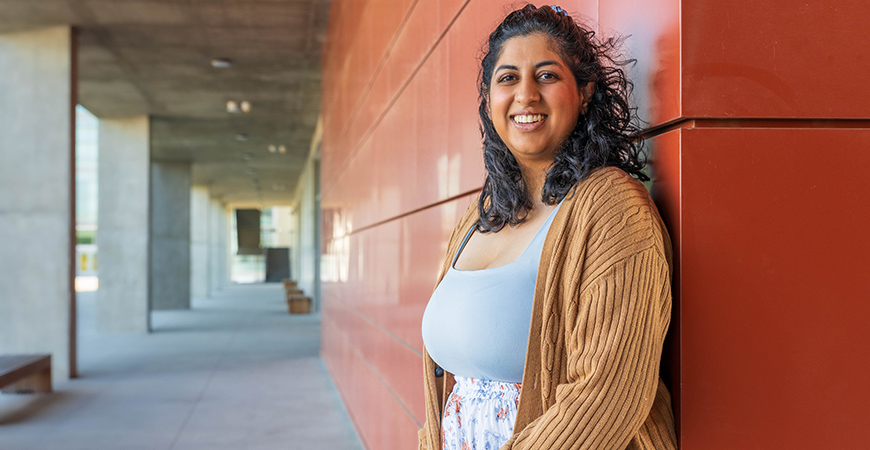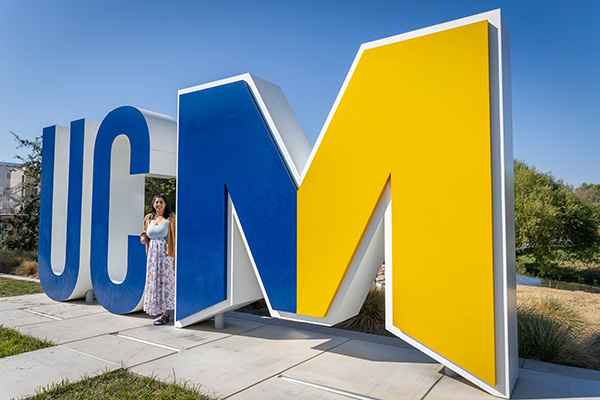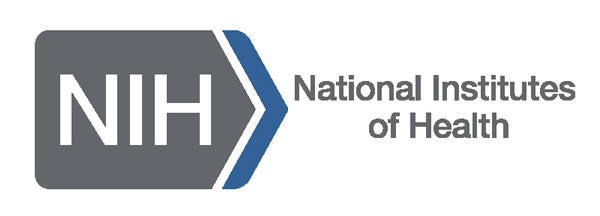
Persistence has paid off for UC Merced doctoral candidate Arabi Seshappan.
The graduate student from Fremont, about to start her sixth year, was selected for the Fulbright U.S. Student Program's Fulbright-Université Paris-Saclay Doctoral Research Award, which is only granted to three U.S. students each year.
“This was my third time applying. I applied once before coming to UC Merced and once during COVID-19,” Seshappan said. “I’m grateful to Becky Mirza and the Office of International Affairs. Becky formed a committee including physics faculty and they reviewed my application and helped inform how I applied for the Fulbright award.”
Along with the monthly stipend and relocation support, the fellowship also offers a dynamic network of past and present Fulbright fellows.
Seshappan’s research focuses on computational condensed matter theory in UC Merced physics Professor David Strubbe's lab. She has been looking at defects in solids to find possible candidates for qubits (quantum bits).

She leaves soon to spend 10 months at a satellite campus of the Université Paris-Saclay in Orsay. Starting Sept. 1, she will study quantum computing solutions with Professor Leonardo Mazza, an expert in fractional quantum spin, a new direction for her dissertation research.
Seshappan’s road to science, and specifically physics, wasn’t direct.
In high school, she failed chemistry. Later, she continued her education at Chabot College, a community college in Hayward. While there, her chemistry professor told her she excelled at the subject.
“Having someone tell me I was good at something for the first time in my life meant everything to me,” she said. “Now, I'm in a Ph.D. program; it wouldn't have happened if she hadn't said that to me.”
Seshappan later transferred to UCLA and earned a bachelor’s degree in chemistry.
After graduation, she explored graduate school options but was told she needed to strengthen her physics experience. She applied to the California State University Louis Stokes Alliance for Minority Participation Bridge to Doctorate program — a comprehensive, statewide program dedicated to broadening participation in science, technology, engineering and mathematics disciplines.
“I participated in the physics program, and I thought, ‘Oh my God, I love it,’” Seshappan said. “I should have done physics from the beginning.”
She applied to graduate programs and found the right fit with Strubbe. She also learned the percentage of female faculty in UC Merced’s Department of Physics is higher than the national average, and that sealed her decision.
Ultimately, Seshappan looks forward to teaching at a historically Black college or Hispanic-serving institution to provide opportunities to people who wouldn’t normally have them.
“I went to a community college where most of the people were Black or Hispanic and didn't have opportunities. The people I met at Chabot College are some of the smartest people that I've ever met,” she said.
This isn't Seshappan's first time going abroad for research. Through Strubbe's connections, she spent time attending a school and conference in Spain. He also assisted her with finding her Fulbright placement.
“As a graduate student, I spent a summer doing research in Spain, which was a formative experience for my research interests and network. I have continued attending a conference in Spain since that time and have brought some of my students. I was impressed that Arabi took the initiative to seek out this Fulbright fellowship and I think it will be a great opportunity for her to make new connections like I did, and build on what she has learned at UC Merced in a new environment,” said Strubbe.
She believes the opportunities for global academic collaborations she has been afforded will help her future students.
“We live in a global society, so it’s important to make these connections,” she said. “I want to be able to send my students to other places so they can have opportunities like I have.”
I was impressed that Arabi took the initiative to seek out this Fulbright fellowship and I think it will be a great opportunity for her to make new connections like I did, and build on what she has learned at UC Merced in a new environment.




